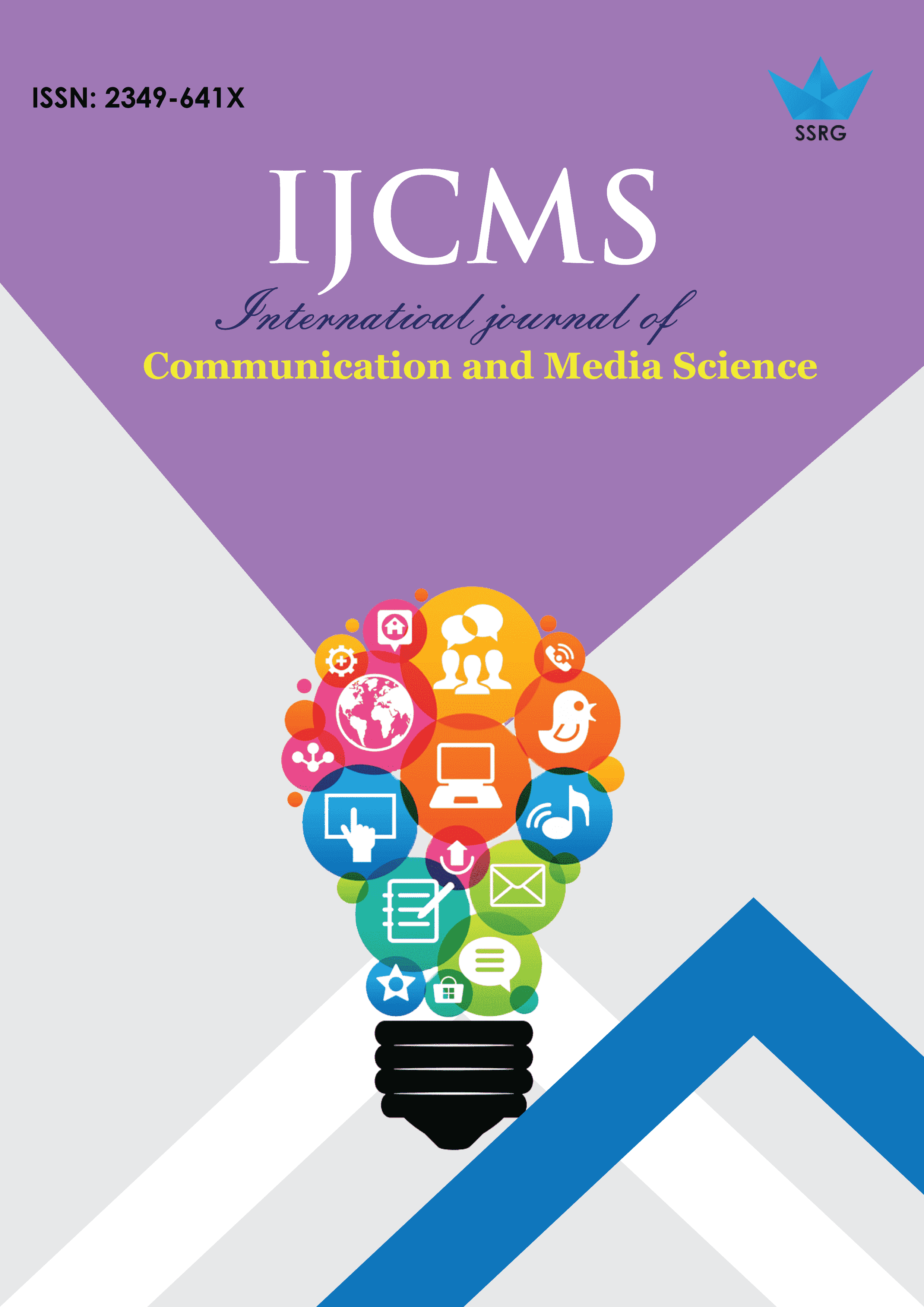Pedagogical Innovations In Media Education In India: Scope And Challenges

| International Journal of Communication and Media Science |
| © 2021 by SSRG - IJCMS Journal |
| Volume 8 Issue 1 |
| Year of Publication : 2021 |
| Authors : Dr.C.M.Vinaya Kumar, Shruti Mehrotra |
How to Cite?
Dr.C.M.Vinaya Kumar, Shruti Mehrotra, "Pedagogical Innovations In Media Education In India: Scope And Challenges," SSRG International Journal of Communication and Media Science, vol. 8, no. 1, pp. 5-7, 2021. Crossref, https://doi.org/10.14445/2349641X/IJCMS-V8I1P102
Abstract:
With several innovations in the arena of Information and Communication Technology and the increasing interaction of the users with the all-pervasive digital world, the need for innovative media education pedagogy has increased tremendously. This paper outlines the larger sense of these developments and considers their effect on media education, both in terms of pedagogical strategies and in terms of the value for the industry. It is essential that Media education and educators/ trainers and media learners also adapt to the change brought by the technology on learning. The study attempts to examine the possibilities and limitations of current practices to reach media industry expectations and how the technological development will further enhance the horizons of changing the pedagogical practices.
Keywords:
Media Education, Technological competencies, Innovative Pedagogy, Media industry, ethics.
References:
[1] Barve, U., Cross-cultural journalism teaching: Case of an Indian university. Paper presented at the 16th AMIC conference and First WorldJournalism Education Congress, Singapore., (2007).
[2] Buckingham, D., Defining digital literacy – what do young people need to know about digital media? In: Digital Literacies: Concepts,
Policies and Practices (eds. C. Lankshear and M. Knobel), (2008) 73–90. Oxford: Peter Lang.
[3] Buckingham, D., Media Education: Literacy, Learning and Contemporary Culture. Cambridge: Polity Press., (2013).
[4] Calvani, Antonio., Dove va la Media Education? Riflessionisull’identitàdella M. E. nellasocietàcontemporanea., Media Education. Studi, ricerche, buonepratiche 1(1)(2010) 13-25.
[5] Desai, – Desai, K.M., Reviewing Communication/Media Education in India: Many Players, Diverse Directions but lost focus…?. Journal of Global Communication, 2(2008) 118-131. [Electronic Source] URL: https://www.researchgate.net/profile/Mira_Desai2/publication/ 280094936_Ind .
[6] De Smedt, T. and Fastrez, P., Développer et mesurer les compétencesmédiatiques. Introduction au dossier. Recherchesen communication 34(34) (2012) 7–19.
[7] Gitelman, L., Scripts, Grooves, and Writing Machines: Representing Technology in the Edison Era. Stanford, CA: Stanford University Press., (1999).
[8] Jacquinot, Geneviève., De quelquesrepérages pour la recherche en education aux médias., In EuroMeduc. L’éducation aux medias en Europe., Controverses, défis et perspectives, edited by Paul Verniers, Bruxelles: EuroMeduc (2009) 143-51.
[9] Jenkins, H., Convergence Culture: Where Old and New Media Collide. New York: New York University Press., (2006a)
[10] Landry, N. and Basque, J., L’éducation aux médias: contributions, pratiques et perspectives de recherche en sciences de la communication. Communiquer. Revue de communication sociale et publique 15 (1) (2015a) 47–63.
[11] Landry, N., Pilote, A.‐M., and Brunelle, A.‐M., L’éducation aux médiasen tant que pratique militante :luttes et résistances au sein des espacesmédiatiques et de gouvernance. In: Les cahiers du Gerse (eds. M. Bonenfant, F. Dumais and G. Trépanier‐Jobin),. Québec: Presses de l’Université du Québec., (2017) 119–139.
[12] Murthy, 2011 – Murthy, C.S.H.N. (2011). The dilemma of course content and curriculum in Indian journalism education: Theory, Practice, and Research, Asia Pacific Media Educator, University of Wollongong, Australia. [Electronic resource]. URL: https://pdfs.semantic scholar.org/b266/db42d0f87a8d52b591b93c0382f41e8fdb39.pdf.
[13] New London Group.A Pedagogy of Multiliteracies: Designing Social Futures,” in Multiliteracies: Literacy Learning and the Design of Social Futures, ed. B. Cope & M. Kalantzis for the New London Group. London: Routledge, (2000) 9-38.
[14] Potter, J.W., Review of literature on media literacy. Sociology Compass 7(6)(2013) 417–435.
[15] Weabey, F.B., L’éducation aux médias : de l’ambiguïté du concept aux défisd’une pratique éducative. Saint‐Denis: Editions Publibook., (2009).

 10.14445/2349641X/IJCMS-V8I1P102
10.14445/2349641X/IJCMS-V8I1P102